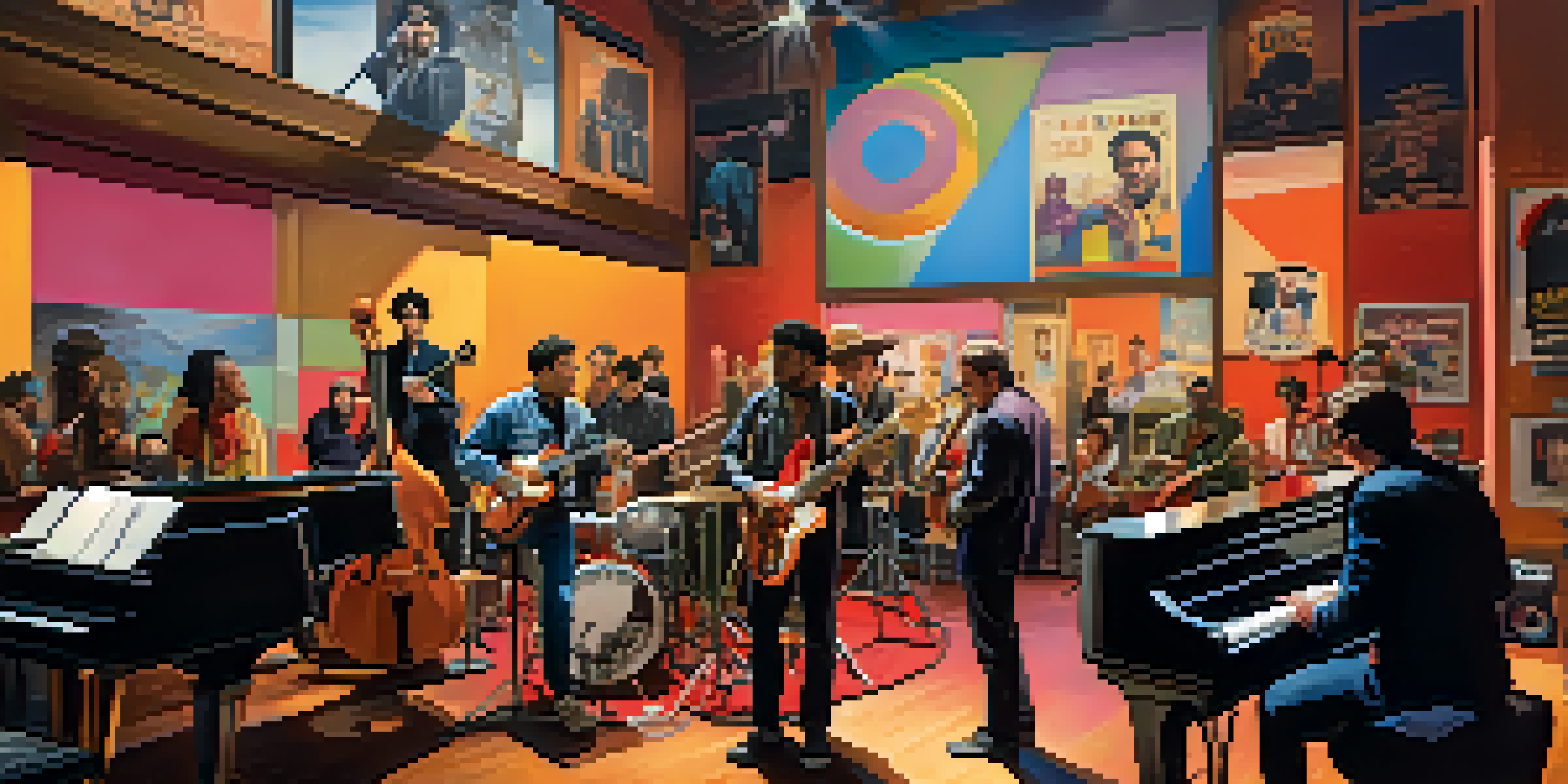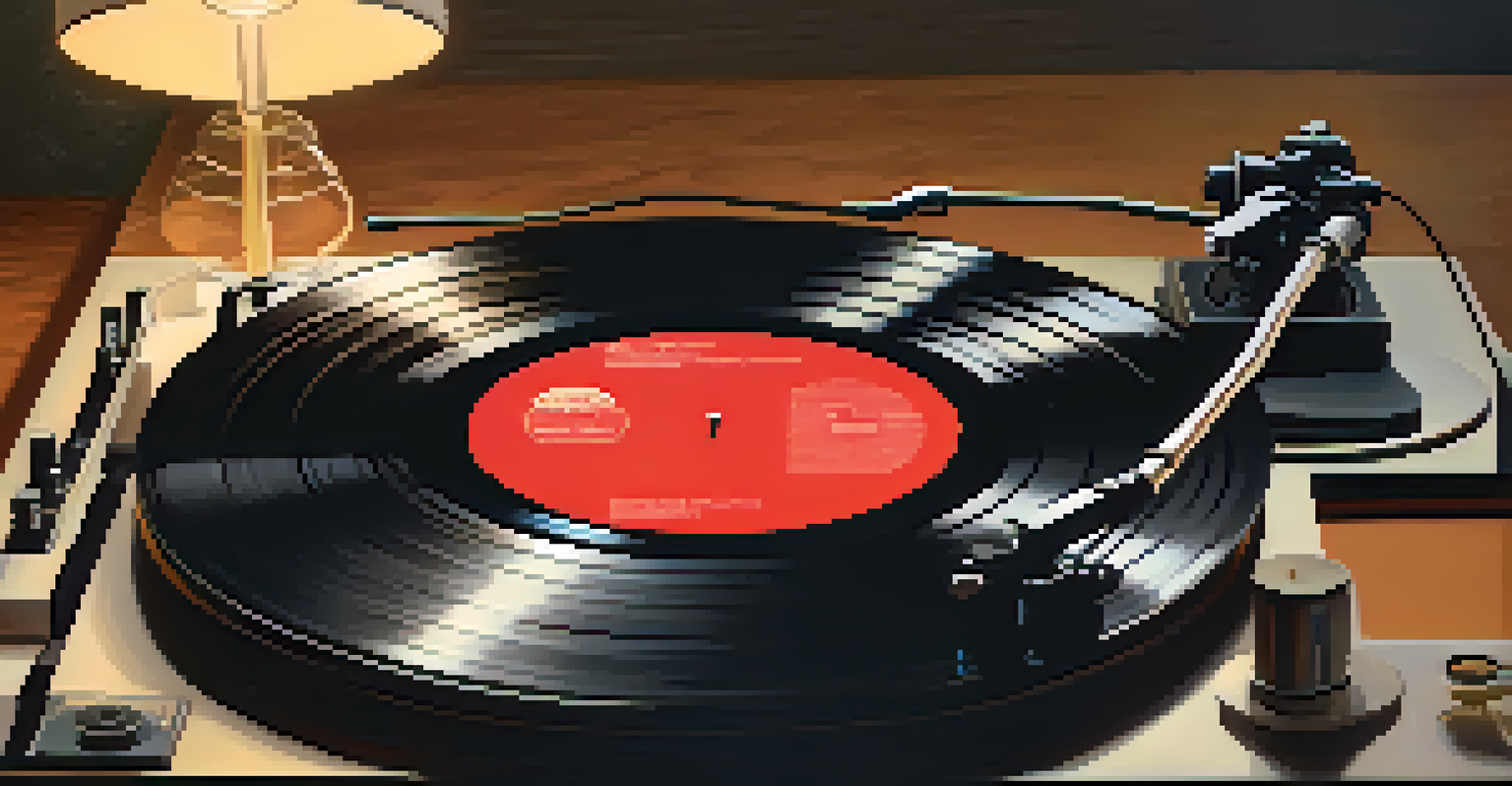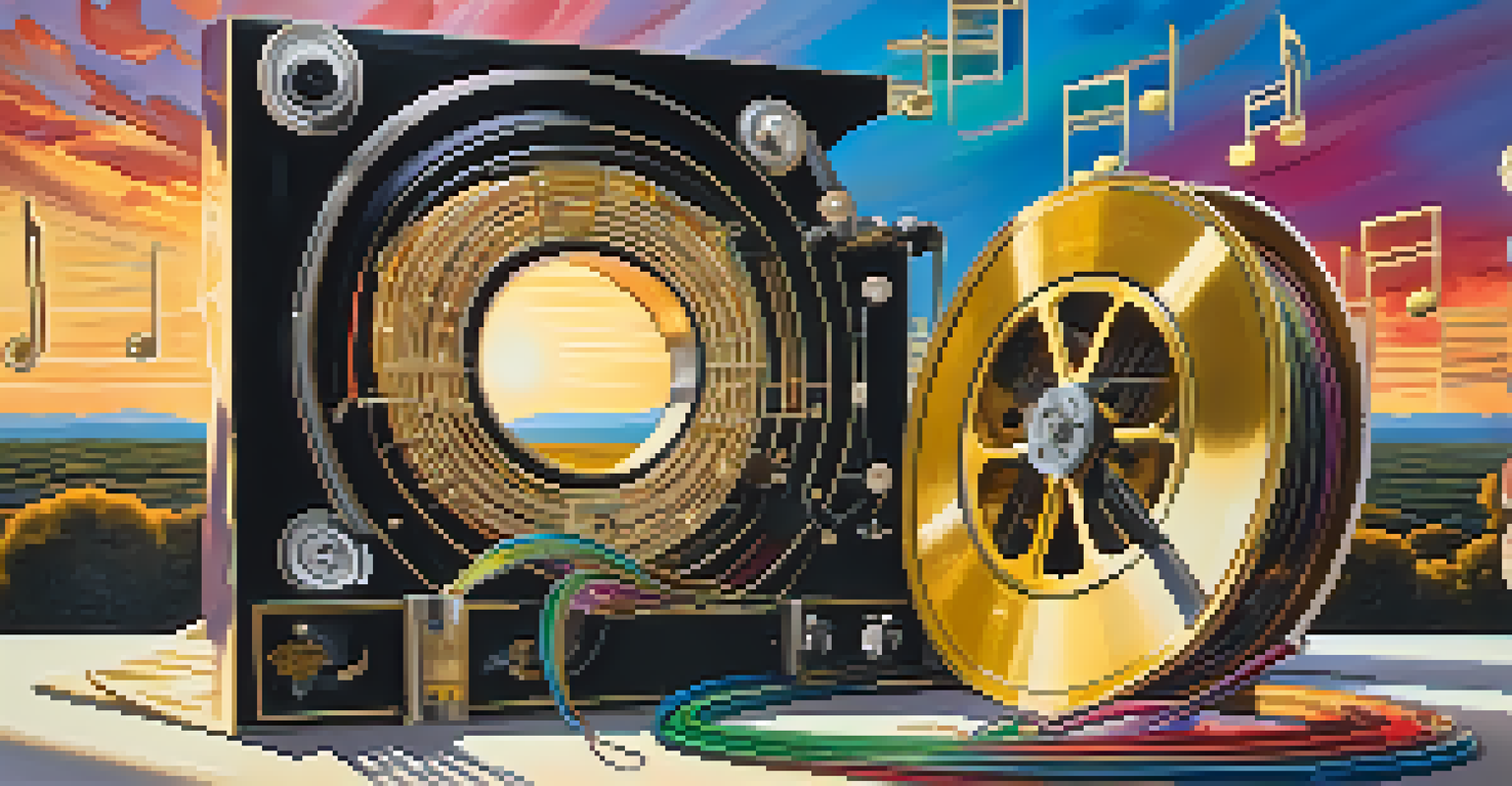The Role of Movie Soundtracks in Shaping Music Genres Worldwide

The Emotional Connection: Soundtracks as Storytellers
Movie soundtracks often serve as an emotional bridge, enhancing the storytelling experience. They can evoke feelings and memories, making scenes unforgettable. For instance, think about the haunting score of 'Inception'—it not only complements the visuals but also heightens the tension and intrigue.
Music can change the world because it can change people.
This emotional resonance is why soundtracks have become pivotal in shaping musical genres. They introduce audiences to new styles, blending genres in ways that create fresh, innovative sounds. For example, the soundtrack of 'Guardians of the Galaxy' ignited a renewed interest in classic rock, showcasing how these songs can transcend their original context.
Moreover, soundtracks can influence listeners' music preferences, leading them to explore entire genres they might not have considered before. This phenomenon illustrates the power of music in film as a tool for cultural exchange and genre evolution.
Historical Impact: Soundtracks and Genre Evolution
Historically, soundtracks have played a significant role in the evolution of various music genres. For instance, the rise of jazz in film noir movies during the 1940s not only popularized the genre but also introduced new artists to broader audiences. Films like 'The Great Gatsby' showcased jazz, helping it flourish beyond its traditional settings.

Similarly, the emergence of rock 'n' roll in the 1950s was propelled by soundtracks from films like 'Rebel Without a Cause.' These soundtracks captured the rebellious spirit of the youth and solidified rock music's place in popular culture. As a result, many young listeners were inspired to pick up instruments themselves.
Soundtracks Enhance Storytelling
Movie soundtracks serve as emotional bridges, amplifying the storytelling experience by evoking feelings and memories.
Over the decades, soundtracks have continuously influenced the mainstream music landscape, allowing for the blending of genres. This dynamic interplay helps keep music fresh and exciting, demonstrating how soundtracks can serve as a launching pad for musical exploration.
Cultural Cross-Pollination Through Film Music
One of the most fascinating aspects of movie soundtracks is their ability to facilitate cultural cross-pollination. Films often feature a diverse array of music styles, showcasing global sounds that audiences may not encounter otherwise. For example, the soundtrack of 'Slumdog Millionaire' introduced millions to Indian music, blending it with contemporary pop.
The music is not in the notes, but in the silence between.
This cultural exchange enriches the listening experience, as it encourages audiences to appreciate and explore different musical traditions. As filmmakers curate their soundtracks, they often select tracks that resonate with the film's themes, leading to a greater awareness of the music's cultural origins.
As a result, soundtracks become a bridge between cultures, allowing listeners to connect with music from around the world. This not only broadens musical horizons but also fosters a sense of community among diverse audiences.
The Role of Technology in Soundtrack Production
Technology has revolutionized the way soundtracks are produced and consumed, impacting music genres significantly. With advancements in digital audio workstations, composers can blend sounds and styles effortlessly, crafting unique soundscapes. This accessibility has enabled emerging artists to collaborate with established musicians, leading to innovative genre fusions.
Moreover, streaming platforms have changed how soundtracks reach audiences, allowing listeners to access a wide variety of music instantly. For instance, the popularity of playlists featuring movie soundtracks has created new trends, encouraging fans to explore artists and genres they might not have discovered otherwise.
Cultural Exchange Through Music
Soundtracks facilitate cultural cross-pollination, introducing audiences to diverse musical styles and traditions.
As technology continues to evolve, we can expect soundtracks to keep shaping music genres, pushing the boundaries of creativity. This evolution reflects the dynamic nature of both film and music, ensuring that they remain closely intertwined.
Iconic Soundtracks That Defined Genres
Certain soundtracks have left an indelible mark on specific genres, becoming iconic in their own right. For example, the soundtrack of 'Pulp Fiction' revitalized surf rock, introducing it to a new generation. The eclectic mix of tracks not only defined the film's quirky vibe but also brought attention to artists who had been largely forgotten.
Another notable example is 'The Bodyguard,' which popularized Whitney Houston's rendition of 'I Will Always Love You,' turning it into a timeless classic. This soundtrack not only showcased Houston's incredible talent but also solidified the connection between pop music and film.
These examples illustrate how soundtracks can elevate songs and help define genres, making them more accessible and appealing to broader audiences. They serve as cultural touchstones, reminding us of the power of music in film storytelling.
The Future: Soundtracks and Emerging Music Trends
As we look to the future, soundtracks will undoubtedly continue to influence emerging music trends. With the rise of social media platforms like TikTok, snippets of soundtracks can go viral, significantly impacting a song's popularity and genre classification. This phenomenon allows for instant exposure of new artists and sounds to global audiences.
Additionally, as filmmakers increasingly seek to diversify their soundtracks, we can expect to see the blending of traditional and contemporary styles. This fusion not only reflects the changing musical landscape but also encourages creative experimentation, paving the way for new genres to emerge.
Technology Shapes Soundtrack Production
Advancements in technology have transformed how soundtracks are created and consumed, fostering innovation and genre blending.
Ultimately, the future of soundtracks is bright, with endless possibilities for innovation. As music and film continue to evolve together, soundtracks will remain a vital force in shaping and redefining music genres worldwide.
Conclusion: The Lasting Impact of Movie Soundtracks
In conclusion, movie soundtracks play an essential role in shaping music genres worldwide. They serve as emotional storytellers, cultural bridges, and catalysts for genre evolution. By introducing audiences to diverse musical styles, soundtracks foster a greater appreciation for different cultures and traditions.
Moreover, the technological advancements in soundtrack production and distribution continue to create new opportunities for artists and listeners alike. As we engage with soundtracks, we witness the dynamic interplay of music and film, and how they influence each other.

Ultimately, the impact of movie soundtracks transcends the screen, leaving a lasting legacy on the music industry and our collective musical experiences. As we enjoy our favorite films, let’s not forget to appreciate the soundtracks that shape the sounds of our lives.